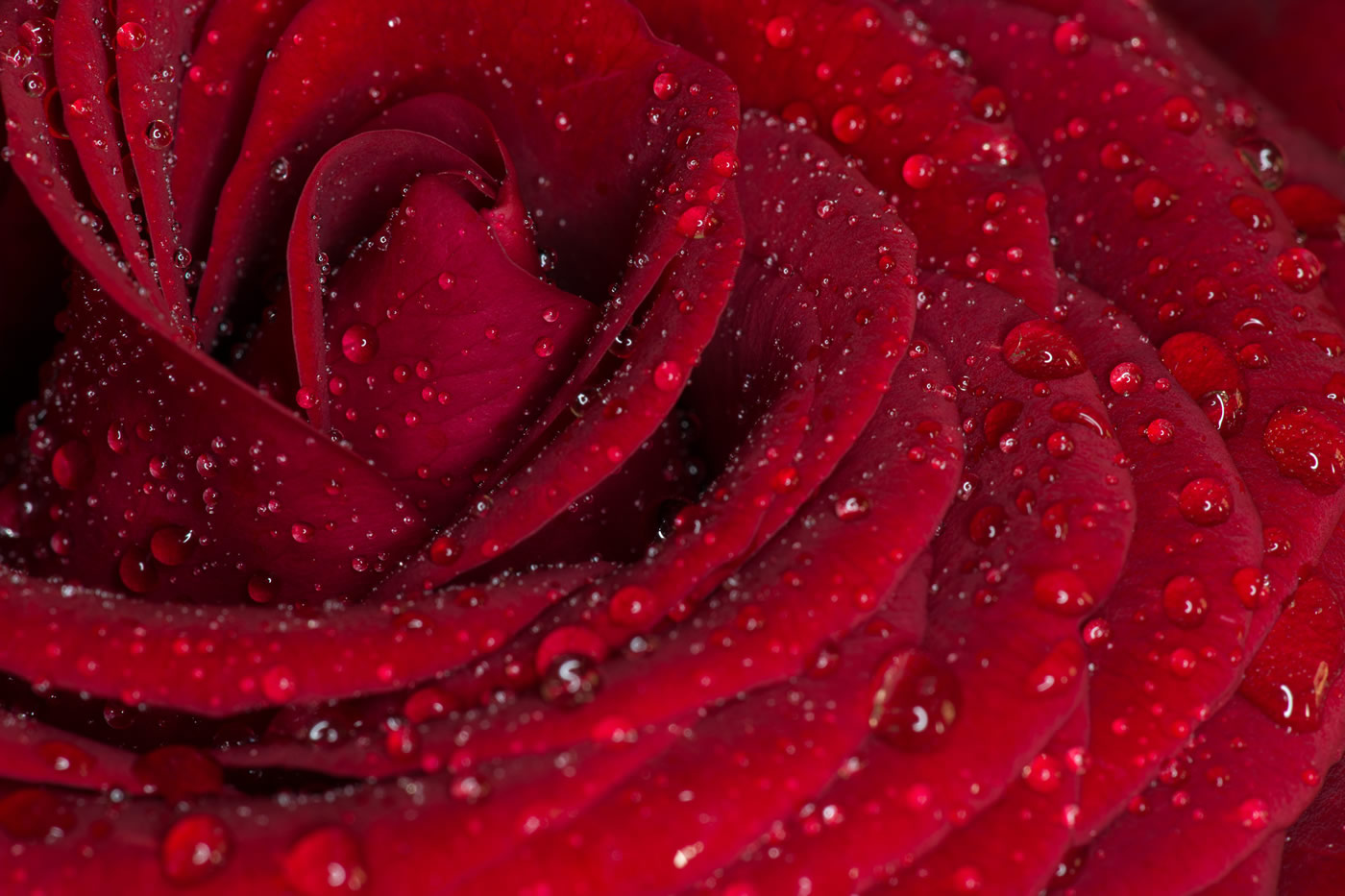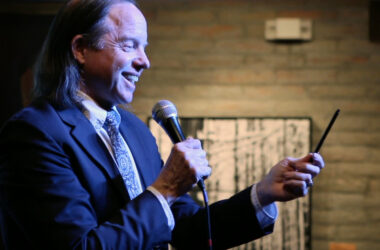Hi, welcome back to the Lam Rim (LAM RIM),. and we’re on episode three. We’re calling this episode the same name as the whole lam rim, which is Love in the Time of the Virus. We’re going to start here in the Tibetan.

chang shar sanggye wangchuk gyelpoy shing na (BYANG SHAR SANGS RGYAS DBANG PHYUG RGYAL PO’I ZHING NA) This means “a paradise” and the word for paradise in Sanskrit is kshetra (kṣetra), and in Tibetan it’s shing (ZHING). It means a beautiful place where everything is perfect. I imagine they’re playing rock & roll there all day long. There’s a special one that’s supposed to be located chang shar (BYANG SHAR), means in the northeast of the universe. So nobody knows where that is exactly, but there’s a tradition to say it’s in the northeast. Amitabha’s paradise, for example, is said to be in the western direction. So in the northeast, there’s supposed to be a Buddha paradise, and the Buddha who’s the boss there is called Wangchuk Gyalpo (DBANG PHYUG RGYAL PO), which means the “king of kings” or the “king of all the extremely powerful beings.” In that Buddha paradise, everything’s going well—it’s like everything is good. There’s no problems. Everything is nice. It’s especially nice, like it’s supposed to be one of the five-star Buddha paradises. They say people there, of course, they treat other people nice. They’re nice to other people. So they are what we call morality, they are keeping it—tsultrim (TSUL KHRIMS). They are keeping it well, they are treating other people sweetly.
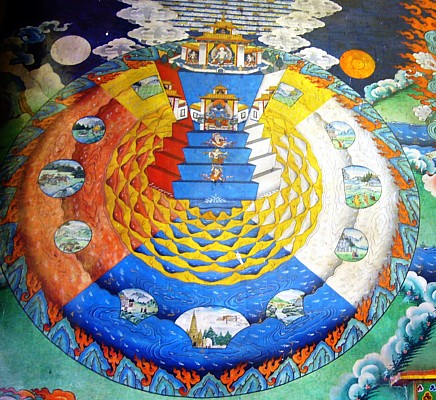
If you sit in that Buddha paradise and you treat other people really nice, for millions and millions of years—kelpay bar sungba le (BSKAL PA’I BAR BSRUNG BA LAS) Compared to that, if you come to mi je jikten (MI MJED ‘JIG RTEN)…and this is a very unusual word, mi je jikten. It’s very confusing—it has confused many people in history, but it’s a word for our world which is called Jambudvīpa, the dzam bu (‘DZAM BU) continent is our world. So it just means here, on our planet. mi je (MI MJED) means “not afraid” and jikten gyi kham (‘JIG RTEN GYI KHAMS) means “loka,” which means “world.” People ask in the ancient books: why is “the world where people are not afraid” a nickname for this planet Earth? The traditional explanation of this word is that people here are not afraid to study the Dharma.
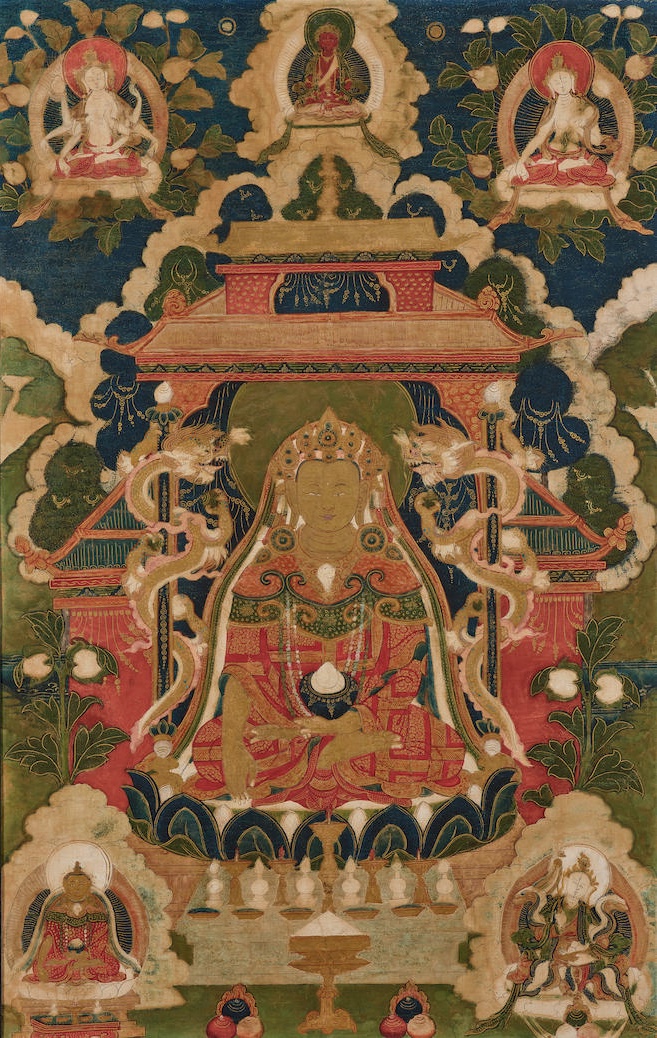
TIBET, CIRCA 1850
We have a really good mix of stability and chaos in our world. So people are happy to study the Dharma. They’re not afraid—mi je. They’re not afraid to study the Dharma. jikten gyi kham su tunpa shakya tuppay tenpa dir (‘JIG RTEN GYI KHAMS SU STON PA SH’AKYA THUB PA’I BSTAN PA ‘DIR) Here in the teachings, the teaching world of Shakyamuni, our Buddha. I like to call him “our Buddha”. tsultrim nyin chik la sungwa (TSUL KHRIMS NYIN GCIG LA BSRUNG BA) If you’re nice to other people in this crazy, mixed-up world for just one day, then it’s better seeds, it’s more powerful seeds, than sitting in that five-star Buddha paradise and being nice to other people. Why? Because this world is a place with a mixture of goodness and chaos. Especially we’re seeing it now in the times of the virus. The virus is spreading, and you can feel people are on edge nowadays. It feels like things can happen suddenly. People in America, we were locked up. We’ve never been locked Then we were told to stay in our houses and you could feel the tension growing in this big country, in this whole country.
[su_icon icon=”icon: link” color=”#ff1259″ size=”20″ shape_size=”12″ url=”https://youtu.be/qZ5l6kCqeqs?t=4m52s” target=”blank”]Video[/su_icon]And even animals were looking uncomfortable. And I think they were picking up on the emotions of the virus days, and the emotions of the humans. And I think it’s very interesting that animals, I guess they haven’t gotten this virus, so it must be strange for them. All the humans are nervous and edgy, it feels like they could explode at any moment, and then all the animals are just picking up on these feelings and they don’t know what it is.
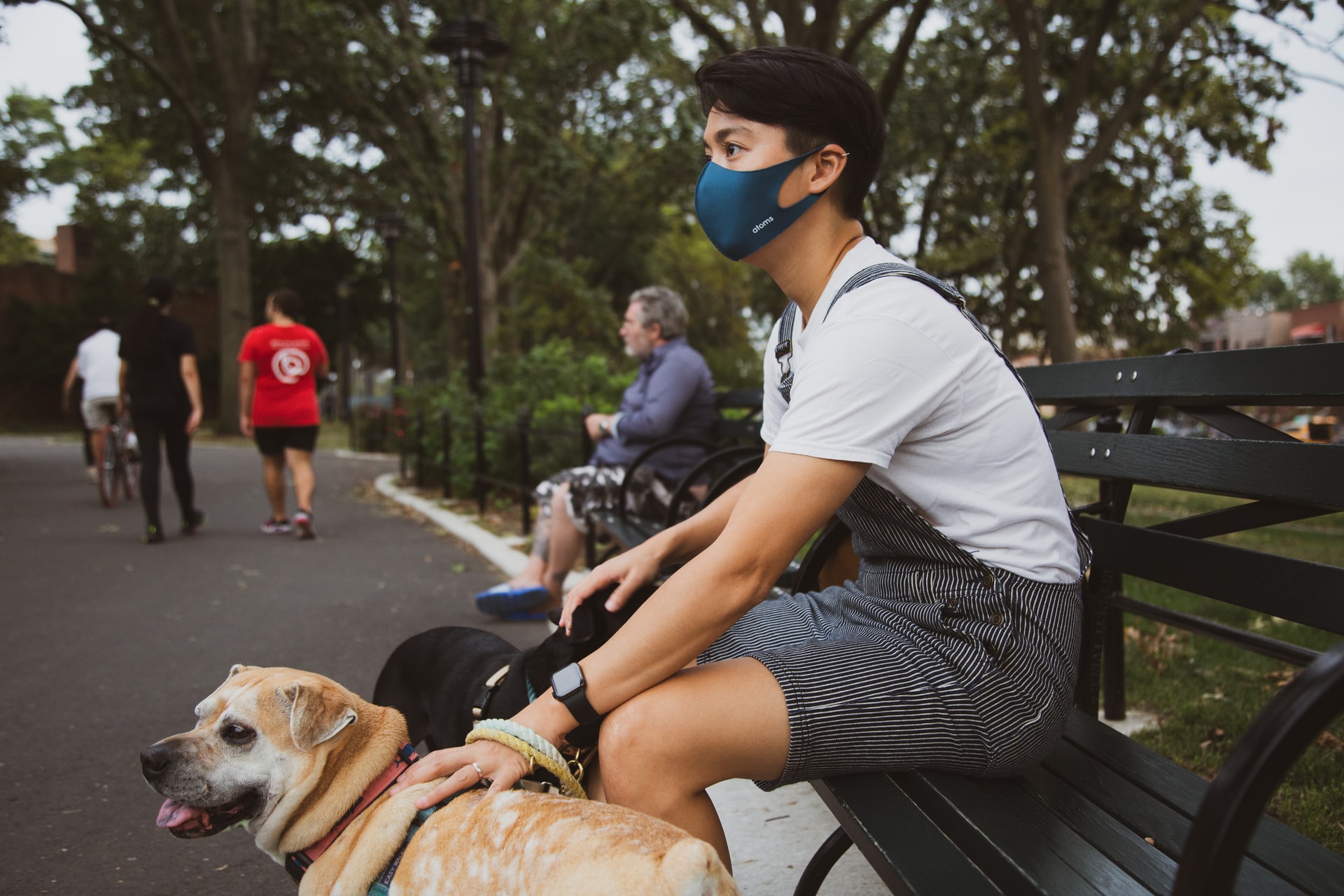
When the times get bad in this world, when there’s a war, when there’s tension between countries, when people are angry at being locked up, and then it breaks out. In this picture you can see pictures of rioting, people throwing things at the police, fires being set. You know, in these times when things are hard and we all feel frightened and we all feel nervous and we’re all feel kind of depressed sometimes, then if you’re nice to another person during this time, you get a lot more karma added to your bank account. You get a lot more good seeds added to your bank account. That’s what this section is talking about. To keep your morality, to be kind to other people, to share what you have when things are crazy—then that’s the sign of a real practitioner. That’s the sign of a really good person.
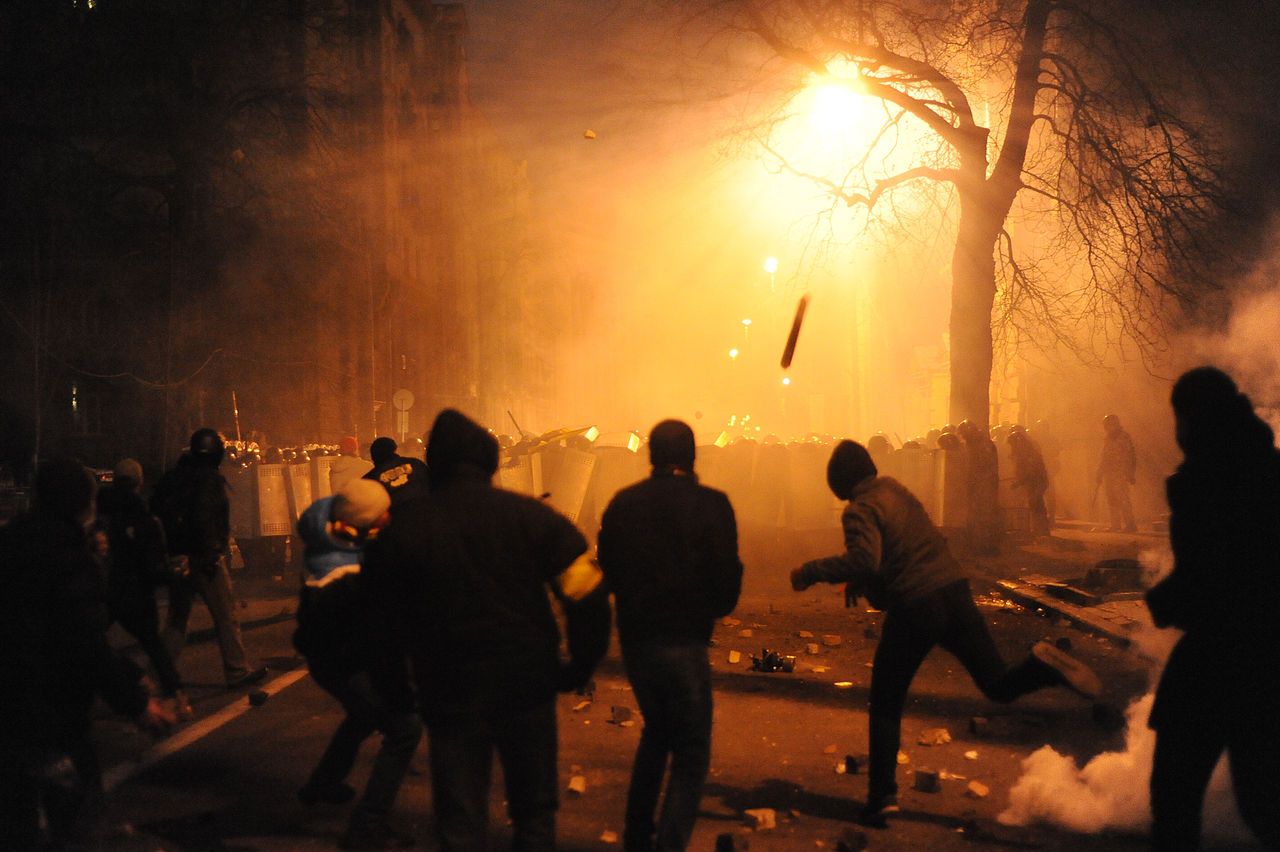
To keep your morality, to be kind to other people, to share what you have when things are crazy—then that’s the sign of a real practitioner. That’s the sign of a really good person.
kalpa nga du lab shi yong dzok sungwa le (BSKAL PA SNGA DUS BSLAB GZHI YONGS RDZOGS BSRUNG BA LAS). So they say the world goes through these huge cycles, and that’s the subject of a book called the Abhidharma Kosha. In the third chapter, they describe amazing descriptions of the world, amazing descriptions of things, and strange things happen. Humans come here from another planet, and then they live here for millions and millions of years, and then slowly things get worse and worse and worse. People are more violent. People aren’t so nice to each other. And then finally there’s a nuclear war. The third chapter of the Abhidharma—which is about two and a half thousand years old, the text, the subject—it talks about a fire which covers the whole earth.
And, strangely, there are some people off on a vacation in the mountains—they went to climb a mountain somewhere—and they don’t get burned up. But they suddenly get this realization from the virus, and they think, “Wow, maybe we’ve been hurting this planet. Maybe we’ve been hurting the other creatures on this planet. Maybe this whole nuclear war or this virus is a karma, because we have hurt the planet and we have hurt the other beings on this planet. We have taken advantage of them. We have treated them like slaves. We have killed them whenever we wanted space for ourselves. And then maybe, a disease comes from those animals to us.” So there is a theme like that in the Abhidharma Kosha. Then those people make a decision to change their lifestyle. They become more ecological. They stop using so much of the world’s resources. They respect other life-forms’ needs for space and prosperity. And then slowly the karma of the planet changes. And so then it goes through these huge cycles.
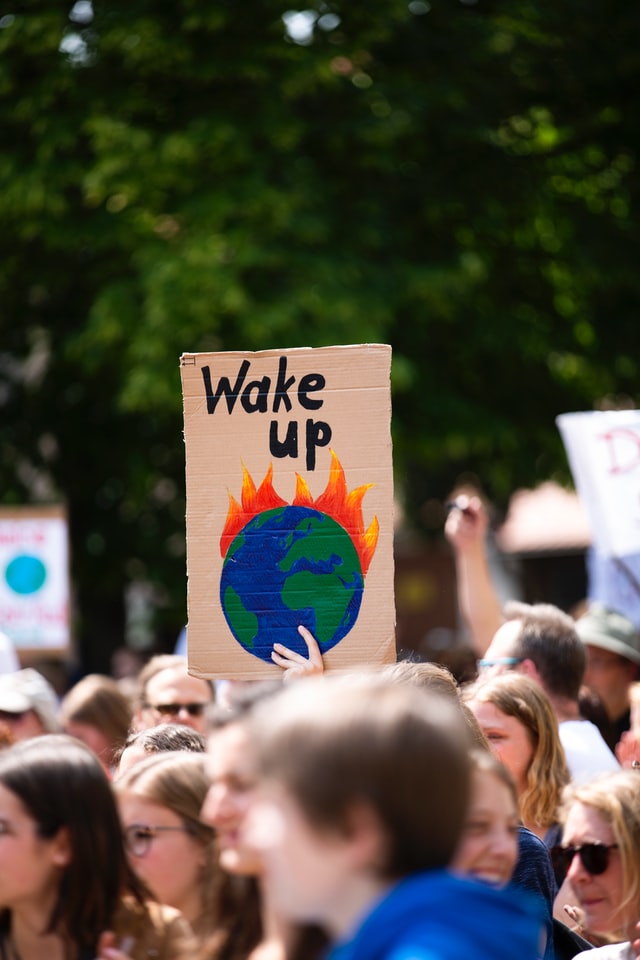
It goes through sixty cycles like that, and that’s called a great kalpa (BSKAL PA), a great eon. So in the early part of the eons are good times. People who survived the holocaust, they are nice to each other, for a while. So those people discover the ten good deeds. It is traditionally said that they keep them very carefully, and they observe the ten good deeds very carefully. Then time goes on and you reach what we call the bottom of the barrel times. We’re actually very close to that bottom of the barrel right now. According to Abhidharma, we are close to the the worst times in the world right now. So if during this time, people are nice to each other and people keep their vows, okay. Here it says:
deng sang lappa na chik rungpa pen yun che (DENG SANG BSLAB PA SNA GCIG BSRUNG PA PHAN YON CHE) So let’s say you don’t get to even the whole list of ten, you don’t get the list of ten good deeds. Someone teaches you the first one and then they have to go. But if you just keep one of the ten good deeds in these hard times, then it’s better than those people at the beginning of time, like Adam and Eve, who are already innocent and already nice. To be nice to other people when times are hard, when the economy is bad, and when there’s a lot of confusion; and when there’s a lot of danger, illness, to keep just one of the Buddhist rules then is more powerful than keeping all of them for a long time—for millions of years.
pen yun chewar sungpe sanggye mangpor kalpa chewar chupa le kyang de hlak la (PHAN YON CHE BAR GSUNGS PAS SANGS RGYAS MANG POR BSKAL PA BYE BAR MCHOD PA LAS KYANG DE LHAG LA,) To keep your patience when things are hard is also better than making offerings to Buddhas for millions of years—when there’s a lot of confusion, when people are divided, when there’s a lot of danger with the virus. To be the calm one, to be the one who shares, to be the one who smiles when things are really crazy, then that’s extremely powerful karma. That’s what they’re talking about. Why are we talking about being nice to other people? We’re talking about how to reach nirvana. Don’t forget where we are in the text. We’re talking about how to reach nirvana.
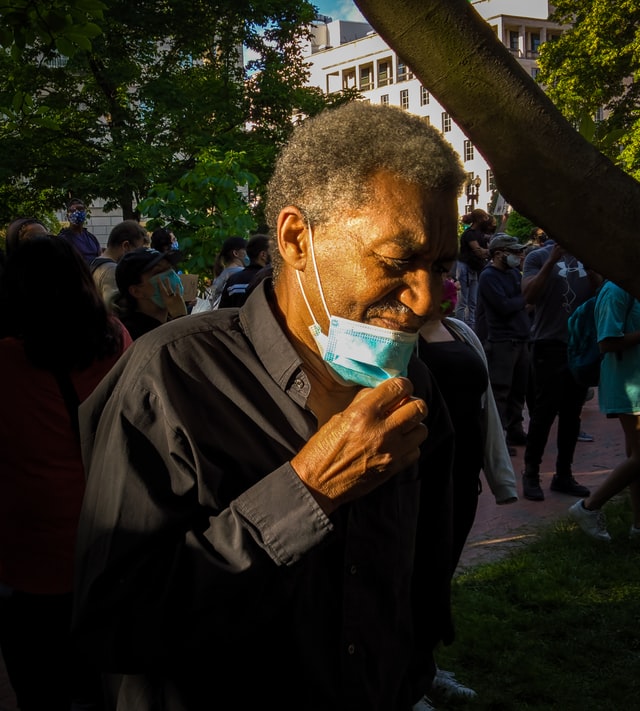
tsultrim denpa sanggye jung dang tre (TSUL KHRIMS LDAN PA SANGS RGYAS ‘BYUNG DANG ‘PHRAD) Then there’s a famous sutra and it’s called the Sutra Where We Honor the Ethical Way of Life. Being a good person. The sutra called “it’s cool to be a good person.” There’s a sutra like that, and it has a famous line in it. tsultrim denpa sanggye jung dang tre. And there’s two ways to read this line. You can say: if a person is nice to other people, it’s as if a Buddha has come to this planet and we have met the Buddha. If you’re a person who shares what you have in these difficult times, and if you’re a person who is patient with people who are afraid or even violent in these difficult times, if you’re the person who stays cool, then we can say the Buddha is walking on this planet. We have met the Buddha again. Then some people read this line as meaning: when the Buddha comes back to this planet, you will have the seeds to meet them. And I think you can read it either way. So, that’s the famous line from that sutra.
[su_icon icon=”icon: link” color=”#ff1259″ size=”20″ shape_size=”12″ url=”https://youtu.be/qZ5l6kCqeqs?t=12m50s” target=”blank”]Video[/su_icon]The monks and nuns—wherever they live, whatever country they live in—twice a month, they’re supposed to get together on the full moon and the new moon. They’re supposed to sit down in a little group and everyone has… they have a green drink. They’re all sitting having a green drink, and the leader says, “Anybody have anything they want to say?” And then somebody will say, “Yeah, I got something.” “Well, what?” “Well, you know, actually I cheated on my taxes a little bit, last week. The taxes were due, you know, I was late. I wrote a letter, I told the tax people my dog ate the paper.” Then they make confessions to each other and it was a very sweet ancient requirement of monks and nuns. I’m afraid nowadays, I’m sad to say, they just recite the words: chok chu na shukpay sanggye dang jangchub sempa tamche dang gendun tsunpa nam dak la dong su sol, dak gelong ming di she gyi wa… (PHYOGS BCU NA BZHUGS PA’I SANGS RGYAS DANG BYANG CHUB SEMS DPA’ THAMS CAD DANG DGE ‘DUN BTZUN PA RNAMS BDAG LA DGONGS SU GSOL, BDAG DGE SLONG MING ‘DI ZHES BGYI BA) And then you just recite it and you go home. But the old system, which is very sweet for Dharma people… and if you’re in a small Dharma group or you’re in your lam rim Dharma group, then tell each other when you make a mistake, it cleans it right away.
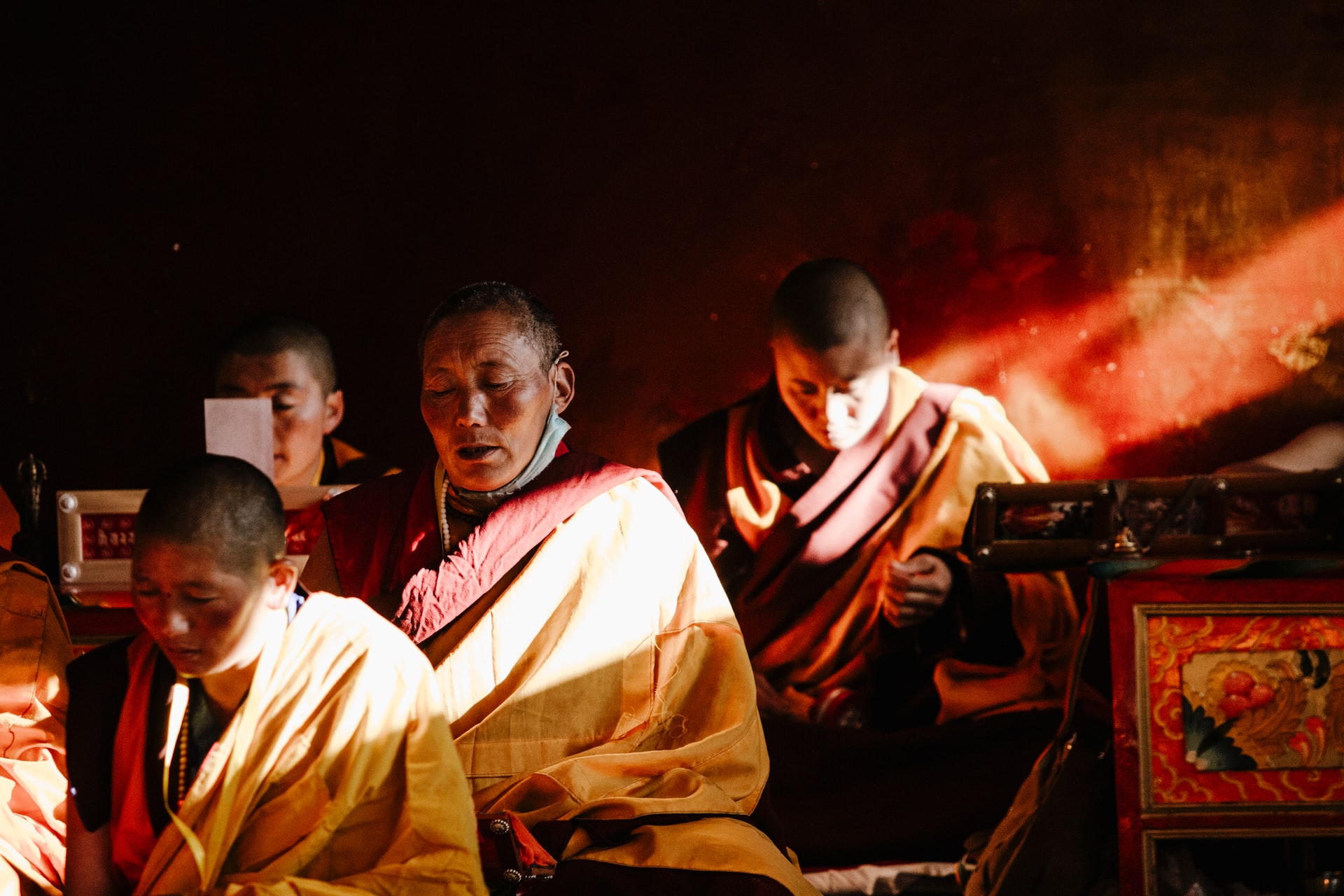
Usually we work harder to hide our bad habits than we do to stop them. But if you just say, “Look, I have a bad habit. I want everybody to know, and I’m working on it.” You know, I got a Covid tummy right now and last night I ate half a Häagen-Dazs ice cream. I’m telling the truth. Confess. Be honest. All right. So at the confession, nowadays, the leader of the confession—who’s usually the abbot of the monastery—will stand up and recite these holy sutras about keeping your vows. So here it says dawa che che na donpa-ang (ZLA BA PHYED PHYED NA ‘DON PA’ANG). So when the leader of the confession group, which is called sojong (GSO SBYONG), when they get up to recite the sutra do dunpa po (MDO ‘DON PA PO), it’s not like they’re a kid in the monastery who is assigned an examination topic where they had to recite the sutra. Because that’s a very common occurrence in the monastery that the kids have to memorize a sutra that the teacher gave them. And they sit there shaking, and trying to recite the sutra by heart.
Look, when the abbot of the whole monastery gets up and he recites these holy words: when you meet a person who treats other people nice it’s like meeting the Buddha. When he recites it, don’t sit there and think he’s some kid who’s taking examination; he’s not. And don’t also think drang sok (GRANGS GSOG). drang sok means when you recite a scripture over and over to get some kind of extra seeds. You know, like you take a rosary and you decide you’re going to recite the Heart Sutra twenty-one times, which we do in the monastery—di ke dak gi tupay du chik na, chomdende gyalpoy kapna ja gu pungpoy ri la gelong gi gendun chenpo dang jangchup sempay gendun chenpo dang tap chik tu shuk te, dey tse chomdende zabmo nangwa shejaway chukyi namdrang kyi tingendzin la nyompar shuk so (‘DI SKAD BDAG GIS THOS PA’I DUS GCIG NA, BCOM LDAN ‘DAS RGYAL PO’I KHAB NA BYA RGOD PHUNG PO’I RI LA DGE SLONG GI DGE ‘DUN CHEN PO DANG BYANG CHUG SEMS DPA’I DGE ‘DUN CHEN PO DANG THABS CIG TU BZHUGS TE, DE’I TSE LDAN ‘DAS ZAB MO SNANG BA ZHES BYA BA’I CHOS KYI RNAM GRANGS KYI TING NGE ‘DZIN LA SNYOMS PAR ZHUGS SO,)
[su_icon icon=”icon: link” color=”#ff1259″ size=”20″ shape_size=”12″ url=”https://youtu.be/qZ5l6kCqeqs?t=16m23s” target=”blank”]Video[/su_icon]So don’t think the guy is trying to pile up these Vinaya sutras on his rosary, these sutras about how to be nice to people. And don’t think he’s taking an exam, because it’s not—because he’s already the abbot. By the way, those of you who are learning Tibetan—and we talked about it yesterday, me, and Seiji, and Tim—to take an exam in English, in American English, means you’re the kid and you are taking the exam from the teacher. But in Tibetan it’s the opposite. The exam is extracted by the teacher—the teacher takes the exam from the student. Okay, so don’t get confused by the Tibetan here. So that Abbot’s not up there… it’s not a game. He’s not a kid. He’s the abbot of the monastery. He’s reciting those words drenpa so (DRAN PA GSO). drenpa so—he’s trying to remind you of how precious it is to be a nice person, especially when it’s hard times. Like right now, in the time of the virus, when people recite this line, when a person is nice to other people, we can say that person is a Buddha walking on this planet. And when you hear them, when you see them share their toilet paper, or you see them share their money when the economy gets bad, when you see them donating money… I have some friends right now, this week they are making major donations. I’m like wow, you guys are…it’s cool. It’s like I met a Buddha, you know? Everyone else is afraid. Everyone else is holding their money. And these people are like, “Do you need money? Do you need money?” Let’s go like that, even in times of the virus.
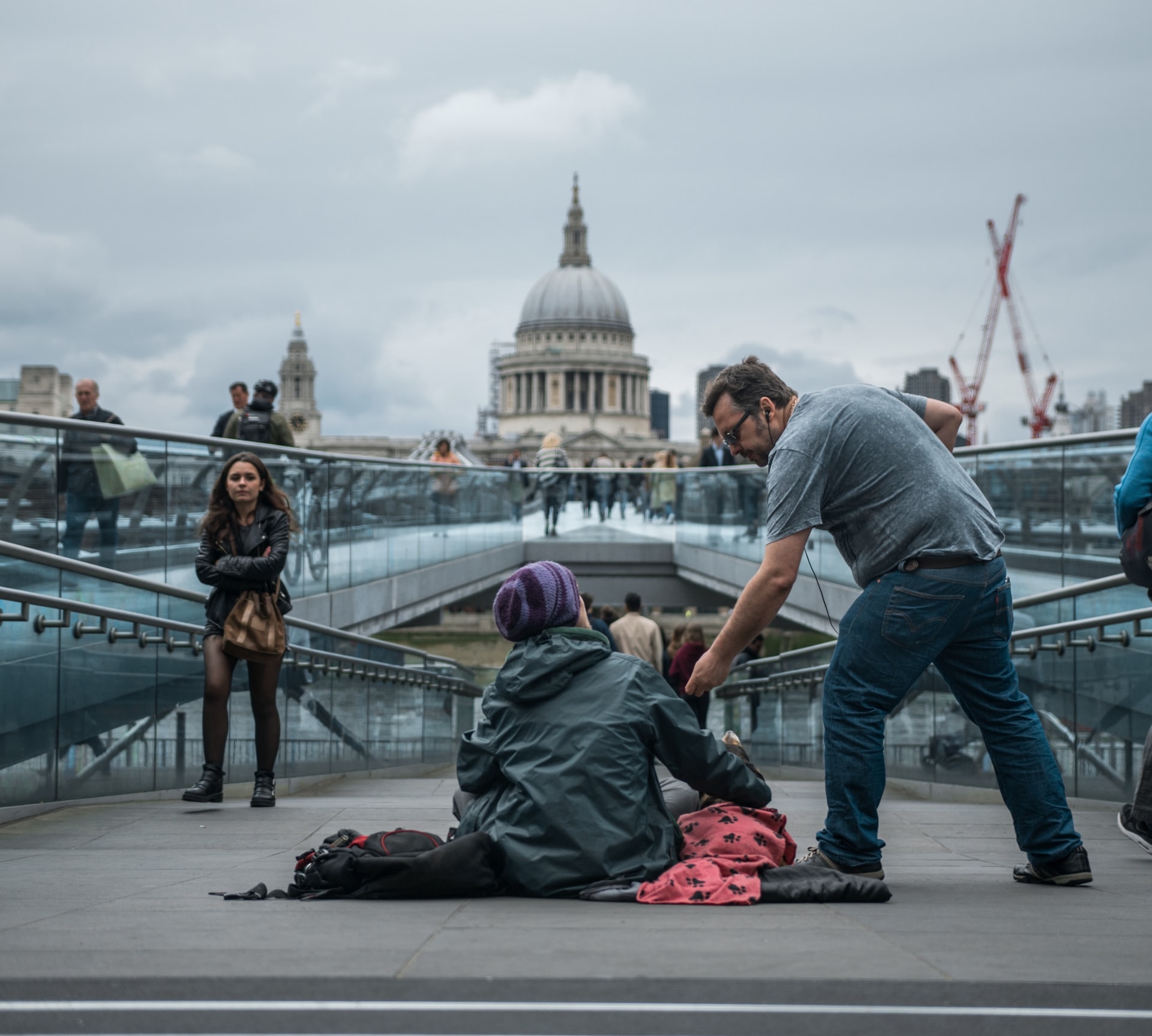
I enjoy going into John Brady’s database—and thank you guys, all you Gold Clubs and Jade Clubs and club clubs, around the world who are collecting donations, it’s amazing! What you’re doing is amazing. Even today we had a Yoga Studies Institute and we were studying some deep, deep, deep ideas about the five envelopes—the five koṣas. We had John Brady’s database. It’s such a cool thing. John Brady to work on that for thirty-three years, that’s unbelievable. So maybe that Buddha’s been walking around for thirty-three years, okay? I wanted to recite to you the poetry from that sutra. I think it’s beautiful. Okay, here we go…
[su_icon icon=”icon: link” color=”#ff1259″ size=”20″ shape_size=”12″ url=”https://youtu.be/qZ5l6kCqeqs?t=19m06s” target=”blank”]Video[/su_icon]de chir tunpe tsultrim rab ngak she, tsultrim denpa sanggye jung dang tre (DE PHYIR STON PAS TSUL KHRIMS RAB BSNGAGS BSHAD,,TSUL KHRIMS LDAN PA SANGS RGYAS ‘BYUNG DANG PHRAD,) tsultrim denpa gyen rnam kun gyi chok, tsultrim jorwa dri dang yukpa yin, tsultrim denpa gawa kun gyi ne, tsultrim denpa dungwa selway chu, tsultrim denpa jikten kun gyi tu, tsultrim dak gi drowa dampa nu, jitar drul dug lu chen nakpo yang, tsultrim chen la nu me shen chi mu, tsultrim denpay gelong u dang den, tsultrim denpa drak gyur dewa tob (,TSUL KHRIMS LDAN PA RGYAN RNAMS KUN GYI MCHOG,TSUL KHRIMS ‘BYOR BA DRI DANG BYUG PA YIN,TSUL KHRIMS LDAN PA DGA’ BA KUN GYI GNAS,TSUL KHRIMS LDAN PA GDUNG BA SEL BA’I CHU,TSUL KHRIMS LDAN PA ‘JIG RTEN KUN GYIS BSTOD,TSUL KHRIMS DAG GIS ‘GRO BA DAM PA MNOS,JI LTAR SBRUL GDUG KLU CHEN NAG PO YANG,TSUL KHRIMS CAN LA GNOD MED GZHAN CI SMOS,TSUL KHRIMS LDAN PA’I DGE SLONG ‘OD DANG LDAN,TSUL KHRIMS LDAN PA GRAGS ‘GYUR BDE BA THOB). Let’s just read that. Let’s just translate that poetry.
de chir tunpe tsultrim rab ngak she, (DE PHYIR STON PAS TSUL KHRIMS RAB BSNGAGS BSHAD) The Buddha says being nice to people is cool, you are hip. You’re like… what’s the thing? What’s the movie? They all run around in black clothes and they’re all very hip? The Matrix. You’re hip like the Matrix. Okay, the Buddha said that.

tsultrim denpa sanggye jung dang tre, (TSUL KHRIMS LDAN PA SANGS RGYAS ‘BYUNG DANG PHRAD) If you’re nice to other people, it’s like I get to meet another Buddha.
tsultrim denpa gyen rnam kun gyi chok, (TSUL KHRIMS LDAN PA RGYAN RNAMS KUN GYI MCHOG) Don’t worry about wearing a Cartier watch or a Tiffany necklace, if you’re treating other people nice, that’s the most beautiful jewelry you can wear.
tsultrim jorwa dri dang yukpa yin, (TSUL KHRIMS ‘BYOR BA DRI DANG BYUG PA YIN) When you are nice to other people, then you are putting on Chanel N°5. Then you really smell good. You know, they say that holy beings can smell… a special smell when you’re being nice to other people. It smells like great cologne or something.
tsultrim denpa gawa kun gyi ne, (TSUL KHRIMS LDAN PA DGA’ BA KUN GYI GNAS) Everyone enjoys a person who is nice to other people.
tsultrim denpa dungwa selway chu, (TSUL KHRIMS LDAN PA GDUNG BA SEL BA’I CHU) Being nice to other people is like cold lemonade on a hot summer day. Okay, that’s nice.
tsultrim denpa jikten kun gyi tu, (TSUL KHRIMS LDAN PA ‘JIG RTEN KUN GYIS BSTOD) Everyone talks about how cool people are when they are nice to other people.
tsultrim dak gi drowa dampa nu, (TSUL KHRIMS DAG GIS ‘GRO BA DAM PA MNOS) drowa dampa nu—they are praised as the coolest people around. And there’s a there’s an error in the Kangyur (BKA’ ‘GYUR), so we fixed it.
jitar drul dug lu chen nakpo yang, (JI LTAR SBRUL GDUG KLU CHEN NAG PO YANG) Poisonous snakes, which we have a lot around here, and other kinds of problems, can’t touch a person who is being nice to other people. People keep asking me, “Oh Geshe-la, what’s the karma that I shouldn’t get the virus?” Just be nice to other people, just serve other people, share what you have with other people. The viruses don’t like those kind of people and they will avoid you. And then by the way, the sutra goes into saying, someone who’s nice to other people is like a light in the world. We already talked about that part of the sutra. Okay.
de le jungwa shin sam te (DE LAS ‘BYUNG BA BZHIN BSAM STE) so think about it… ke lang…ke langpay che tsam nam tsul shin sung (KHAS BLANGS PA’I BCAS MTSAMS RNAMS TSUL BZHIN BSRUNG) Keep your commitments, keep the commitments you have.
tenpay nyingpo ring du sel je shok (BSTAN PA’I SNYING PO RING DU GSAL BYED SHOG,) then there’s a lot of prayers in Buddhism, there’s a lot of lam rim prayers and they end this way: tenpay nyingpo ring du sel je shok—May I be the person who makes the teaching shine in the world. May I be the person who keeps these teachings shining like the sun in this world. May I be the person who keeps these teachings shining like the sun in this world. And there’s another version of that called lobsang gyelway tenpa gye gyur chik (BLO BZANG RGYAL BA’I BSTAN PA RGYAS GYUR CIG) May the teachings of Tsongkapa, the Buddha Tsongkapa, may they spread in this world. It’s a very, very famous prayer. May I be the person to spread these teachings in the world. May the teachings spread in the world.
May I be the person who keeps these teachings shining like the sun in this world

yang tor mar rang rang gi gyu la gyepa shik gu (YANG THOG MAR RANG RANG GI RGYUD LA RGYAS PA ZHIG DGOS,) And we see here in the picture, fingers making a heart. And what the lama said in the lam rim, he said, “Come on! You guys, you sit here in the monastery and every day you recite these prayers and the last line of the prayer is always, “May I help the light of the Buddhas” teachings spread in the world. May I take the Dharma to every country in the world. May I be the supreme spreader of the Dharma in all countries among all people. May I be the one who spreads it in the world.” And then the lama said, “You know the best way to do that?” And everybody’s like, “What?” And he says, “Spread it here.” [pointing to heart] It’s very funny. “Oh, you want to spread the Dharma in the whole world?” “Yeah.” “Oh, you want to be the person who teaches everybody in the whole world the Dharma?” “Yeah.” “Oh, you want to be this light that shines like the sun in the whole world?” “Yeah, yeah—that’s me. I want to be that.” “Okay. Well, how about you start here? And spread it like two inches here?” [at heart]

Okay, and then we can say you’re a Dharma spreader. Then we can say you’re spreading the Dharma in the world. So spread it in your heart. Especially in these difficult times when things are so hard. Everyone’s afraid. It’s not just some people—everyone’s afraid. This virus is amazing Buddhist practice, because it doesn’t matter how much money you have, it doesn’t matter where you live. It doesn’t matter how powerful you are. It doesn’t matter how many muscles you have. This virus is dangerous for everybody. So we can get afraid and we can lose our morality. We can start to cheat people, or not share our things, or steal toilet paper, or we can start to throw things at people—rioting, breaking stores, you know? I just bought a small cafe. I worked really, really hard to fix it up. And I’m just watching on TV where people smashed these people’s little stores. I’m like, “That’s so dumb!” I mean you should smash… smash something rich people… these little guys tried so hard to build their little stores. And so… by the way, I’m not saying you should, but I’m just saying resist this fear and resist this temptation to act crazy, or to act in a way that hurts other people.
A real Buddhist person, during the time of the virus, should become more peaceful, more moral, more kind, more generous than they were before
A real Buddhist person, during the time of the virus, should become more peaceful, more moral, more kind, more generous than they were before. This is the time to do that. Let’s see in the next episode how we can do that.
Thank you.

